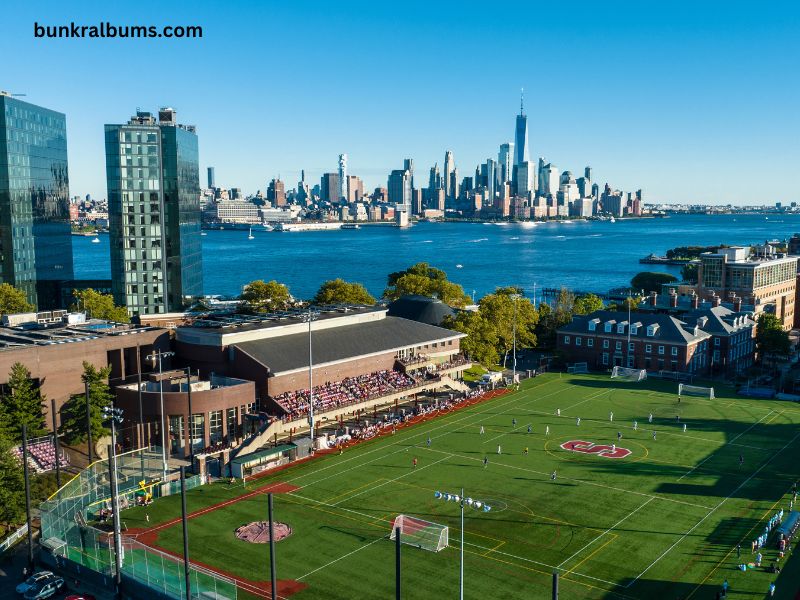Stevens Institute of Technology, often referred to as Stevens, is a renowned private research university located in Hoboken, New Jersey. Established in 1870, it is one of the oldest technological universities in the United States and has a rich history of innovation, academic excellence, and a strong commitment to research. The institution is known for its rigorous programs in engineering, science, technology, and business, producing graduates who are well-equipped to contribute to and lead in their respective fields.
Historical Background
Stevens Institute of Technology was founded by Edwin A. Stevens, a prominent engineer, inventor, and member of a wealthy New Jersey family known for their contributions to the development of steam transportation. The university was established with a clear mission: to educate and inspire the next generation of engineers and scientists. The original curriculum was heavily focused on mechanical engineering, reflecting the needs of the industrial age. Over the years, Stevens has expanded its academic offerings to include a wide range of disciplines while maintaining a strong emphasis on engineering and technology.
Campus and Facilities
Stevens is situated on a 55-acre campus overlooking the Hudson River, providing stunning views of the Manhattan skyline. The campus blends historical architecture with modern facilities, creating an environment that fosters both tradition and innovation. Key facilities on campus include the Charles V. Schaefer, Jr. School of Engineering and Science, the School of Business, and the College of Arts and Letters. The university also boasts state-of-the-art research laboratories, technology centers, and collaborative workspaces that support a wide range of academic and research activities.
Academic Programs
Stevens Institute of Technology offers a broad array of undergraduate, graduate, and doctoral programs across its four schools:
- Charles V. Schaefer, Jr. School of Engineering and Science: This school is the heart of Stevens, offering programs in fields such as mechanical engineering, civil engineering, chemical engineering, computer science, and biomedical engineering. The school is recognized for its interdisciplinary approach, allowing students to engage in research that spans multiple areas of expertise.
- School of Business: Stevens’ business school emphasizes the integration of technology and analytics into business education. Programs such as the MBA, Financial Engineering, and Business Intelligence and Analytics are designed to prepare students for leadership roles in a technology-driven global economy.
- School of Systems and Enterprises: This school focuses on systems thinking, engineering, and management. It offers specialized programs in systems engineering, enterprise architecture, and engineering management, among others. The curriculum is designed to address complex, large-scale challenges in industries ranging from defense to healthcare.
- College of Arts and Letters: This college offers a diverse range of programs in the humanities, social sciences, and the arts, with a unique emphasis on the intersection of technology and society. Programs in literature, history, philosophy, and visual arts are complemented by courses that explore the ethical, cultural, and social implications of technological advancements.
Research and Innovation
Research is a cornerstone of the Stevens experience. The university is home to several research centers and institutes that focus on cutting-edge areas such as cybersecurity, artificial intelligence, sustainability, and healthcare innovation. Notable research centers include:
- The Center for Secure and Resilient Maritime Commerce (CSRMC): This center focuses on maritime security, aiming to enhance the safety and security of the maritime transportation system through advanced research and technology development.
- The Stevens Institute for Artificial Intelligence (SIAI): SIAI is a multidisciplinary research center that brings together experts in AI, machine learning, data science, and related fields to tackle complex problems in areas such as healthcare, finance, and autonomous systems.
- The Center for Environmental Systems (CES): CES is dedicated to research in environmental engineering and sustainability, addressing challenges such as water quality, waste management, and renewable energy.
Stevens’ commitment to innovation is further exemplified by its robust entrepreneurship ecosystem. The Stevens Venture Center provides resources, mentorship, and funding opportunities to students and faculty interested in launching startups. The annual Innovation Expo showcases the creative and entrepreneurial spirit of the Stevens community, highlighting student projects, research, and startups.
Student Life
Stevens Institute of Technology offers a vibrant and diverse student life experience. The university has over 100 student organizations, including academic societies, cultural clubs, and recreational groups. These organizations provide students with opportunities to pursue their interests, develop leadership skills, and build a sense of community.
Greek life is also an integral part of the Stevens experience, with several fraternities and sororities active on campus. These organizations are involved in various philanthropic activities and play a significant role in campus social life.
Stevens places a strong emphasis on student well-being, offering a range of services including mental health counseling, academic support, and career development resources. The university’s Career Center is particularly notable for its success in helping students secure internships and full-time employment, with a strong network of alumni and industry connections.
Athletics and Recreation
Athletics is another key aspect of life at Stevens. The university’s athletic teams, known as the Ducks, compete in the NCAA Division III as a member of the Middle Atlantic Conference (MAC). Stevens offers a variety of sports, including soccer, basketball, swimming, and tennis. The athletic program is known for its strong performance, with several teams regularly competing at the national level.
For those interested in recreational sports, Stevens provides numerous intramural and club sports options. The university’s sports and fitness facilities, including the Schaefer Athletic Center, offer students a range of options for staying active and healthy.
Global and Community Engagement
Stevens Institute of Technology is committed to global engagement and community service. The university offers a range of study abroad programs, allowing students to gain international experience and a global perspective on their education. Stevens has partnerships with institutions around the world, providing opportunities for academic exchange, collaborative research, and cultural immersion.
In addition to global engagement, Stevens is deeply involved in the local Hoboken community. The university regularly hosts events and programs that benefit the local area, including educational workshops, public lectures, and community service projects. Stevens students and faculty are active in volunteering and working on initiatives that address local challenges, such as environmental sustainability and economic development.
Alumni and Impact
Stevens Institute of Technology has a strong network of alumni who have made significant contributions to various fields. Stevens graduates are known for their technical expertise, innovative thinking, and leadership skills. The university’s alumni include successful entrepreneurs, CEOs, engineers, scientists, and academics.
One of the most notable alumni is Frederick Winslow Taylor, known as the father of scientific management. Taylor’s work in industrial engineering and efficiency has had a profound impact on modern management practices. Another distinguished alumnus is Henry Gantt, the inventor of the Gantt chart, a tool widely used in project management today.
Stevens alumni continue to play an important role in advancing technology and innovation, with many contributing to major technological developments and industry breakthroughs.
Challenges and Future Directions
Like many institutions, Stevens Institute of Technology faces challenges as it looks to the future. The rapidly changing landscape of higher education, driven by technological advancements and shifting student demographics, presents both opportunities and challenges. Stevens is actively working to adapt its curriculum, research focus, and campus infrastructure to meet these evolving demands.
The university is also focused on increasing diversity and inclusion within its community. Stevens recognizes the importance of creating an environment where students from all backgrounds can thrive and is committed to initiatives that promote equity, diversity, and inclusion.
In terms of future directions, Stevens is poised to continue its leadership in areas such as artificial intelligence, sustainability, and healthcare innovation. The university’s strategic plan outlines goals for expanding research capabilities, enhancing the student experience, and strengthening global partnerships.
Conclusion
Stevens Institute of Technology stands as a beacon of innovation and academic excellence in the fields of engineering, science, technology, and business. With a rich history, a commitment to research, and a focus on preparing students for the challenges of the future, Stevens continues to be a leader in higher education. The university’s impact is felt not only through its academic programs but also through its contributions to industry, society, and global progress. As Stevens looks to the future, it remains dedicated to its mission of educating and inspiring the next generation of innovators and leaders.







